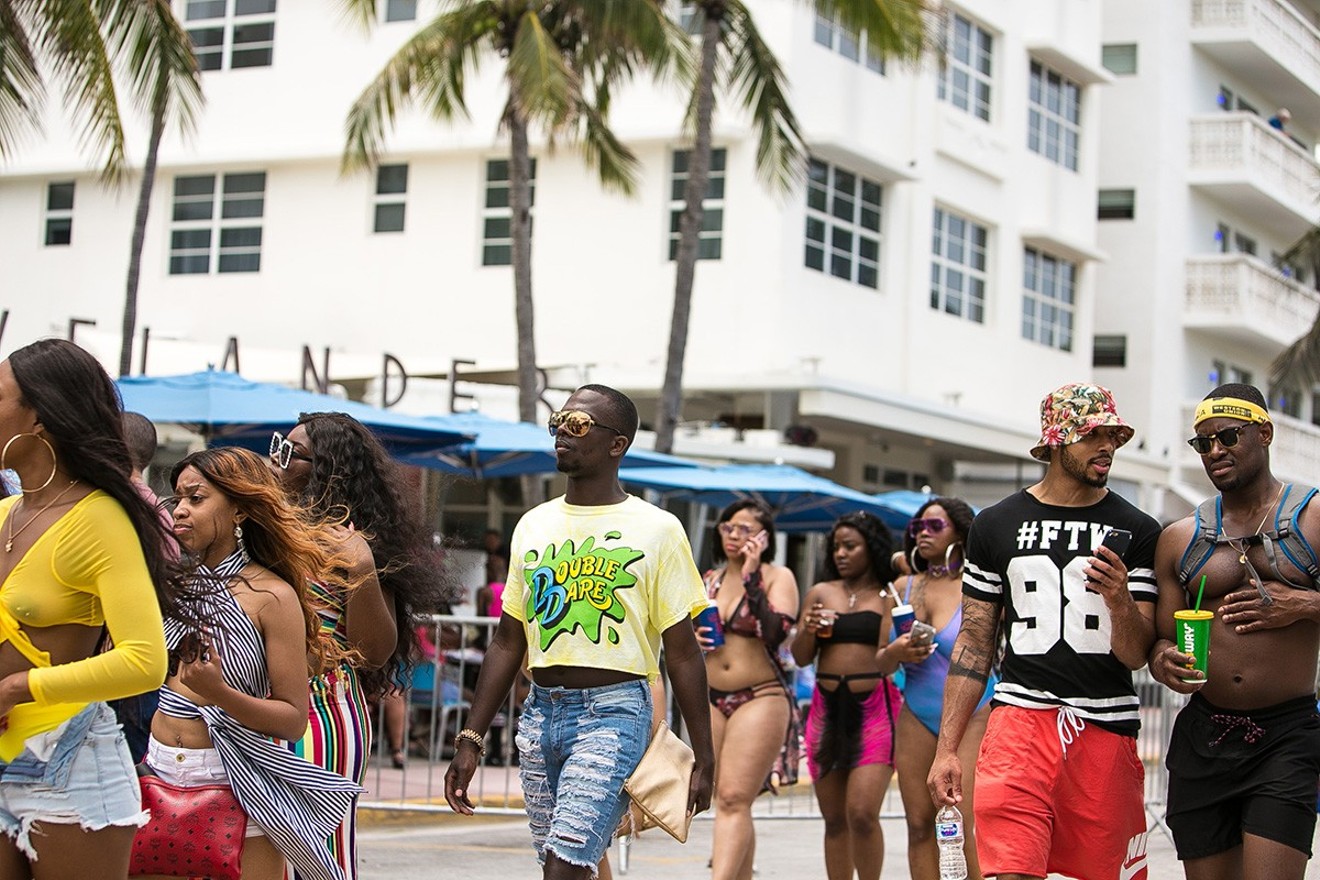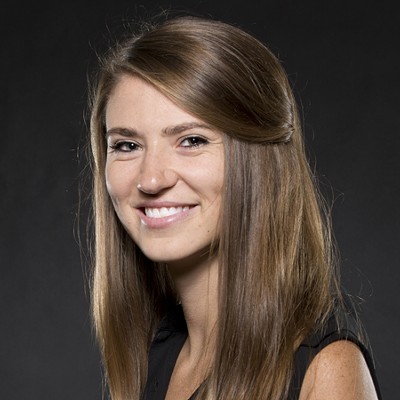Miami Beach officials haven't exactly rolled out the welcome mat for the thousands of mostly black revelers who flock to the city each year for Memorial Day weekend. Over the 20 years the city has unwittingly hosted the unsanctioned, loosely organized Urban Beach Week, police have drastically stepped up patrols, banned stereo speakers and coolers from the beach, and installed license-plate readers on the causeways. In 2017, after two fatal shootings, then-Commissioner Michael Grieco called a news conference to announce he wanted to end the event for good.
But this year, the city has sought out local artists of color to curate installations and exhibits aimed at black visitors. The goal is to change perceptions of Memorial Day weekend and of Miami Beach, City Manager Jimmy Morales wrote in an April 25 letter to the mayor and commissioners. With a theme of "Reframe" and "Trust as Currency," the letter said, the effort is meant to spark "crucial conversations about inclusion, blackness, and relationships."
"The whole idea of what we're doing here is meant to reframe the narrative; reframe the media's opinion on what's going on, what we're doing; reframe the experiences of residents, of tourists, of visitors, of this weekend," says Matt Kenny, director of the city's Tourism and Culture Department. "And to reframe our future."
The initiative, first reported by the Miami Times, comes amid efforts by city leaders to tame spring break and Memorial Day weekend. After a particularly chaotic spring-break season, during which police patrolled the beach in riot gear in response to raucous crowds and fighting, commissioners passed ordinances cracking down on event promoters during so-called high-impact events. Pointing to a flyer for a party with the tag line "No rules," Mayor Dan Gelber argued promoters were to blame for the rowdy atmosphere.
Historically, Miami Beach has been criticized for treating Memorial Day weekend differently from other large-scale events that attract mostly white crowds, such as Art Basel. In a letter last year about the city's plans to begin policing loud car stereos, the NAACP wrote there is "a strong feeling in Miami-Dade’s African-American community that Black visitors to Miami Beach are held to a tougher standard and treated more harshly than others." City leaders have cited safety as their motivation for increased police presence, pointing to the 2017 shootings and other incidents over the years.
In recent years, Miami Beach has tried to redirect Memorial Day visitors to city-sponsored activities, an effort that grew out of a "blue ribbon committee" that included leaders with the NAACP and Southern Christian Leadership Conference. Last year, there was a concert, a gospel performance, and a basketball game.
The arts and cultural programming, which is being rolled out for the first time this year, is an extension of that effort. Morales' letter emphasizes the programming would change the way people think about the weekend, possibly through a digital campaign that would "start to get the positive side of Memorial Day weekend out in the public realm" and "help combat the incessant negative attacks from the media."
The city's tourism department approached prominent artist and author Octavia Yearwood to steer the effort, and she agreed, seeing a chance to make it "something where people are seeing their reflection" and to change impressions of the weekend. She hopes to highlight the integral role people of color have played in building Miami Beach, as well as the city's segregated history.
"I think the media sometimes portrays it as an infiltration," she says. "Sometimes it comes off like that. Where [in reality] people of color have built what the culture of Miami Beach is."
The city is spending $100,000 on programming, which is being arranged by Yearwood, along with artist Jared McGriff. Specifics are still being finalized, but the installations will include digital signage on Ocean Drive and an exhibition titled "I See You, Too" in an empty Lincoln Road storefront. Curated by Yearwood and Naiomy Guerrero — curatorial fellow of Pérez Art Museum Miami’s Diversifying Art Museum Leadership Initiative — "I See You, Too" will combat misinformation and propaganda about minorities.
Yearwood says she hopes art can help "shift the energy of the city" over Memorial Day weekend, during which police are so often on high alert and everyone is "hypersensitive."
"When I was thinking about this, the first thing I thought about is the fact that every relationship has flaws," she says. "And I think this is a flawed relationship that is hopefully on the mend."
[
{
"name": "Air - MediumRectangle - Inline Content - Mobile Display Size",
"component": "19274298",
"insertPoint": "2",
"requiredCountToDisplay": "2"
},{
"name": "Editor Picks",
"component": "17482312",
"insertPoint": "4",
"requiredCountToDisplay": "1"
},{
"name": "Inline Links",
"component": "18711090",
"insertPoint": "8th",
"startingPoint": 8,
"requiredCountToDisplay": "7",
"maxInsertions": 25
},{
"name": "Air - MediumRectangle - Combo - Inline Content",
"component": "17482310",
"insertPoint": "8th",
"startingPoint": 8,
"requiredCountToDisplay": "7",
"maxInsertions": 25
},{
"name": "Inline Links",
"component": "18711090",
"insertPoint": "8th",
"startingPoint": 12,
"requiredCountToDisplay": "11",
"maxInsertions": 25
},{
"name": "Air - Leaderboard Tower - Combo - Inline Content",
"component": "17482313",
"insertPoint": "8th",
"startingPoint": 12,
"requiredCountToDisplay": "11",
"maxInsertions": 25
}
]












